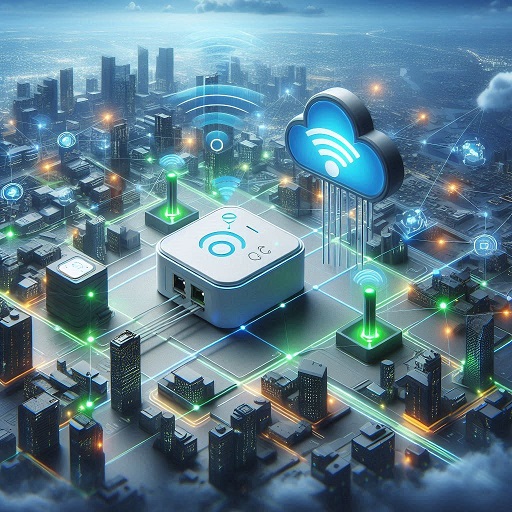The Internet of Things (IoT) has revolutionized how we interact with the world around us, enabling seamless communication between devices and the cloud. Central to this technological advancement are IoT nodes and gateways, which play crucial roles in data collection, processing, and transmission. This article delves into the applications of IoT nodes and gateways across various sectors, highlighting their significance in smart cities, industrial settings, healthcare, agriculture, and retail.

The global IoT Node and Gateway market size was valued at USD 424.6 billion in 2024 and is estimated to reach USD 604.7 billion by 2029, registering a CAGR of 7.3% during the forecast period.
Stay ahead of the competition— Download PDF Brochure and make informed decisions to power your business growth!
Applications of IoT Nodes and Gateways
The Internet of Things (IoT) has revolutionized how we interact with the world around us, enabling seamless communication between devices and the cloud. Central to this technological advancement are IoT nodes and gateways, which play crucial roles in data collection, processing, and transmission. This article delves into the applications of IoT nodes and gateways across various sectors, highlighting their significance in smart cities, industrial settings, healthcare, agriculture, and retail.
IoT Nodes and Gateways in Smart Cities
Smart cities leverage IoT nodes and gateways to enhance urban living through improved infrastructure, sustainability, and quality of life.
Key Applications:
- Traffic Management: IoT nodes deployed in traffic signals and on vehicles collect real-time data on traffic flow, enabling intelligent traffic management systems to optimize signal timings and reduce congestion.
- Public Safety: Smart surveillance cameras equipped with IoT gateways monitor public areas, enabling rapid response to incidents. These systems can analyze video feeds for unusual activities, alerting authorities as necessary.
- Smart Lighting: IoT nodes can control streetlights, adjusting brightness based on ambient light conditions and reducing energy consumption during off-peak hours.
- Waste Management: Smart bins equipped with IoT sensors signal when they need to be emptied, optimizing waste collection routes and reducing operational costs.
Industrial Applications of IoT Nodes and Gateways
In industrial environments, IoT nodes and gateways facilitate enhanced automation, monitoring, and efficiency.
Key Applications:
- Predictive Maintenance: IoT nodes attached to machinery monitor performance metrics in real time, enabling predictive maintenance that reduces downtime and extends equipment life.
- Supply Chain Optimization: Gateways aggregate data from various nodes across the supply chain, providing real-time visibility into inventory levels, shipment status, and production schedules.
- Environmental Monitoring: IoT nodes can track temperature, humidity, and other environmental factors, ensuring that manufacturing processes adhere to quality standards and regulatory requirements.
- Energy Management: Smart meters equipped with IoT technology allow industries to monitor energy consumption patterns, leading to more efficient energy use and cost savings.
IoT in Healthcare: Nodes and Gateways
The healthcare sector has witnessed significant transformations due to IoT nodes and gateways, which enable remote monitoring, improved patient care, and efficient data management.
Key Applications:
- Remote Patient Monitoring: IoT nodes in wearable devices and home health monitors collect vital signs and health metrics, transmitting data through gateways to healthcare providers for real-time analysis.
- Asset Tracking: Hospitals use IoT gateways to track the location and availability of medical equipment, reducing time spent searching for devices and improving operational efficiency.
- Smart Medication Management: IoT-enabled pill dispensers remind patients to take their medication and can alert caregivers if a dose is missed, enhancing adherence to treatment plans.
- Telemedicine: Gateways facilitate secure communication between patients and healthcare providers, enabling virtual consultations and reducing the need for in-person visits.
Agricultural Applications of IoT Nodes and Gateways
IoT nodes and gateways are revolutionizing agriculture by enabling precision farming and efficient resource management.
Key Applications:
- Soil Monitoring: IoT nodes placed in fields collect data on soil moisture, pH levels, and nutrient content, enabling farmers to make data-driven decisions regarding irrigation and fertilization.
- Livestock Tracking: IoT devices attached to livestock monitor health metrics and location, ensuring the well-being of animals and optimizing herd management.
- Climate Control: Greenhouses equipped with IoT nodes can monitor environmental conditions, automatically adjusting temperature and humidity levels to optimize plant growth.
- Supply Chain Efficiency: IoT gateways facilitate real-time tracking of produce from farm to market, ensuring freshness and reducing waste.
IoT Nodes and Gateways in Retail
The retail sector is increasingly adopting IoT nodes and gateways to enhance customer experiences and streamline operations.
Key Applications:
- Smart Shelves: IoT nodes embedded in retail shelves monitor inventory levels in real time, notifying staff when products need restocking and preventing out-of-stock situations.
- Customer Analytics: Retailers use IoT devices to track customer behavior within stores, gathering data on foot traffic and dwell times to optimize store layouts and improve marketing strategies.
- Personalized Shopping Experiences: IoT gateways enable retailers to communicate with customers’ mobile devices, offering personalized promotions and recommendations based on real-time data.
- Supply Chain Management: IoT technology enhances visibility in the supply chain, allowing retailers to monitor inventory levels, manage logistics, and reduce operational costs.
IoT nodes and gateways are integral to the advancement of various sectors, driving innovation and efficiency in smart cities, industrial applications, healthcare, agriculture, and retail. By enabling real-time data collection and communication, these technologies facilitate informed decision-making, enhance operational efficiency, and improve customer experiences. As the IoT ecosystem continues to evolve, the role of nodes and gateways will only become more critical in shaping the future of connectivity and smart solutions across industries.
